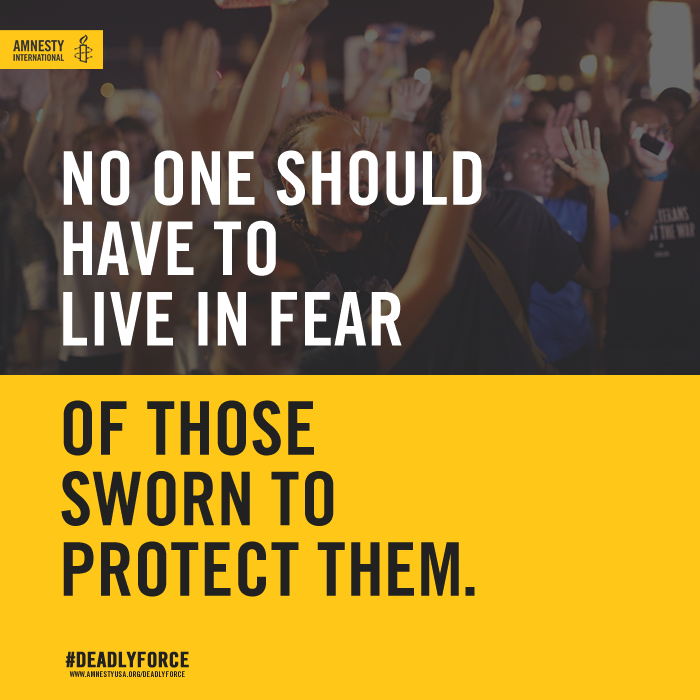
As we tick past the one-year anniversary of Mike Brown’s death, we find ourselves in the midst of yet another state of emergency in St. Louis, protestors again lining the streets of West Florissant Avenue, and seemingly a new name added every day to the list of people -mostly people of color- killed at the hands of police.
I’m seeing this all from a room in St. Louis, and I can’t help but wonder: Why am I here? Has progress been made or is history repeating itself?
Last year, following Brown’s death and the heavy-handed police response to peaceful protestors and journalists in St. Louis, AIUSA deployed an observer delegation to Ferguson, to monitor the policing of protests. AIUSA deployed a similar delegation in the days before and after it was announced in November that a St. Louis grand jury would not indict Darren Wilson for Brown’s death, as well as a delegation to Baltimore in the wake of protests following the death of Freddie Gray in police custody.
Currently, AIUSA is in St. Louis hosting its annual Human Rights Leadership Institute with member leaders and volunteers from all over the country, including many local residents, in order to equip them with the tools and resources to go back into their community and create solutions-driven dialogue on a range of issues standing in the way of human rights in the US and beyond, including police abuses. The hope is that with this dialogue, they will forge relationships and the knowledge to help create the real change we deserve in the US and globally.
Why? Why am I here in St. Louis, here talking to a room full of 100 people, many of them youth leaders, about a human rights-centered legislative campaign for change on police use of lethal force? In the past year, as I’ve watched the hashtags surge raising up the names of those killed in police encounters, the pace of change on police accountability feels heartbreakingly slow. It is a bloody slowness – every day that change doesn’t arrive, that’s another life gone.
Yet the protestors have kept on marching despite the odds. And over the past year, Amnesty has shown its commitment in its research, activism and training. In October 2014, Amnesty released a report called “On the Streets of America: Human Rights Abuses in Ferguson,” describing the human rights violations documented by the AIUSA observer delegation. The report raises concerns about patterns of racial discrimination and excessive use of police force. Then, earlier this summer, we released a follow-up report titled “Deadly Force: Police Use of Lethal Force in the United States” a state-by-state legislative survey on the use of lethal force statues – where they exist — in the US. It confirms that all 50 states fail to comply with international law and standards on the use of lethal force by law enforcement, including a nationwide failure to require accountability mechanisms or even to reliably track the number of people killed by police.
My colleagues and I are also working with partner organizations and individuals on the ground in Ferguson, Baltimore and cities throughout the country to bring awareness of ongoing human rights violations and the United States’ failure to prevent abuses connected to improper use of lethal force. And ultimately to bring change.
The current unrest in Ferguson is a salient reminder of the work ahead. As a grassroots human rights organization, we are helping our local members and activists organize in key states around the country to demand statutes be introduced or amended to meet international standards on the use of lethal force. We also calling for the creation of a National Crime and Justice Task Force, recognizing that for real change to occur we have to reform the U.S. criminal justice system to ensure that it’s both fair and just, and that all are equal before the law.
And while Ferguson may be at the center of the debate, it is increasingly clear that unnecessary or excessive use of force by police is a national and even international problem, impacting us all. Our colleagues at Amnesty International Brazil recently released a report, “You Killed My Son,” which presents damning evidence of police killings, extrajudicial executions and other human rights violations committed by the military police in the city of Rio de Janeiro, which will host the Olympics in less than a year. The report finds that there have been more than 8,466 cases of police killing registered in the State of Rio Je Janeiro, including 5,132 in the city of Rio Je Janeiro over a 10-year period (2005-2014).
Dr. Martin Luther King, Jr once said, “Injustice anywhere is a threat to justice everywhere.” That still rings true. So, from my perch in St. Louis, I send out the call to continue to stand in solidarity and demand reform in Ferguson, and to do it nationally, and I encourage us also to do the same with the people of Rio Je Janeiro and people everywhere who are demanding reform. Together we can be a movement for real change.
It's clear to non-ideologues that Michael Brown was completely to blame for his own death. People who value their lives don't attack cops and try to steal their guns.
The above comment by Mr Riegel is why we must continue the cause against human rights causes in all 50 states. You can't reason away the use of lethal force.
Peace to all
It's funny how Andrew is so sure that Michael Brown attacked a cop. That has NEVER been proven. Excessively shooting a teenager in his back is NEVER justified.. Hannah you are exactly right.. People like Andrew Riegle are the exact reason I keep fighting for justice FOR ALL!
My name is precious odum hail from rumuekpe in emohua local govt intevers state.nigeria rumuekpe need serious aids from amnesty international because of high level of human rights violations by the iocs and govt at all levels in nigeria